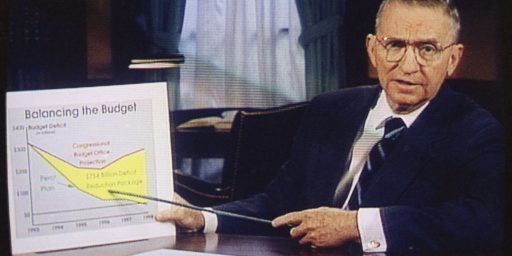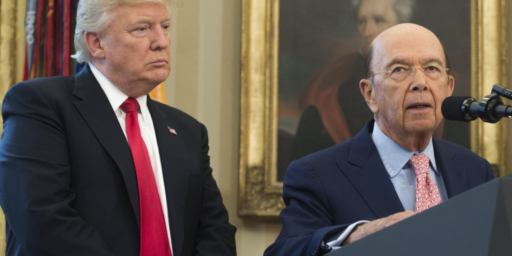The Bush Tax Hikes
On this day in 1990, President H.W. Bush broke his "No new taxes" pledge.
Taegan Goddard reminds us that, on this day in 1990, President H.W. Bush reached a budget agreement with Congressional Democrats on the budget.
Less than a month later, Saddam Hussein invaded Kuwait and Bush would go on to preside over a major military victory that pushed his approval ratings into the 90s. And then to get trounced in the 1992 elections by an unknown governor with a zipper problem.
While a minor recession was a major reason, many assign a large share of the blame to this budget deal. Most significantly, he reneged on his famous promise from the 1988 Republican Convention: “Read my lips: No new taxes.” This ultimately hurt him deeply with his base, leading to a primary challenge from Pat Buchanan and the strange third party candidacy of Ross Perot.
This morning, I noted that Republicans should remember the consequences of the 1996 budget showdown with Bill Clinton that resulted in reversing his fortunes. But I suspect Republican leaders in Congress are far more worried about the lesson of the 1990 budget deal. The Tea Party wing, especially, will be very angry if they give in even a little bit on taxes. And President Obama appears willing to risk the collapse of America’s economy to force them to either do that or raise the debt ceiling.







Well, a big part of the Republican calculation is that without a strong showing of a willingness to reign in the budget deficit growth, America’s credit rating is going into the toilet. The warning of the downgrade isn’t over the fantasy default of this deal but over the lack of will to get things back to manageable. No one suspect the US will renege on our current debt but many are worrying that we’ll keep borrowing at a faster pace till that becomes the only recourse.
Obama isn’t going to face a backlash from progressives for cutting 2-4 trillion in spending? That won’t have consequences? Obama’s willing to go out and take his lumps it seems, and he’s expecting the GOP to be willing to do the same.
@JKB:
Actually there are two separate warnings. There is one about long-term problems about also a more immediate one about the consequences of not raising the debt ceiling (either a default or just a massive and immediate cut in spending).
It is a mistake to conflate the two issues.
Oh, right. As I’ve been saying in the other thread I agree that they are about forcing the tax question in the 2012 election ..
but I think they’ve blown it, jumped the shark.
“No new taxes” doesn’t work when revenues are at historic lows and deficit is at historic highs.
“And President Obama appears willing to risk the collapse of America’s economy to force them to either do that or raise the debt ceiling.”
What the hell?
>While a minor recession was a major reason, many assign a large share of the blame to this budget deal.
Translation: many = Republicans.
It has long been a central tenet of the Party of Norquist that Bush lost because of his reneging on the “no new taxes” promise, rather than because of far more obvious factors such as the economic fundamentals. You then go on to suggest Buchanan as a cause (primary challenges are mainly a symptom rather than a cause of a president’s weakness) and then you rehash the myth that Perot cost Bush the election. It’s a myth that refuses to die, despite having been debunked many times.
Correct. And that’s really the lesson to take away, here. (Are you listening, GOP in the house? Are you listening, Mitch?
But even further, the Democrats used the broken promise to beat Bush over the head with, which is exactly why Clinton got into office. Of course the irony is that once there, before even the proverbial mailbox paint was dry, we got “I tried, I really did, but I can’t give you the tax breaks I promised” from Clinton.
Yes, it does, when the issue is stopping the spending and the growth of government. And have you seen the polls? Most folks by nearly 2 to 1, don’t want the debt limit increased, or the taxes. Seems to be working just fine, there.
“What the hell?”
Someone had the funny line “Jiu-Jitsu!”
The idea is that the GOP flips it to Obama holding up negotiations with an inflexible demand for tax. Never mind that the tax slice is very thin, and the Obama position is actually a demand for cost-cutting first, and revenue increase as a small accommodation.
For an excellent review/history of the Bush Tax Deal see…
http://www.thefiscaltimes.com/Articles/2010/06/25/A-Budget-Deal-That-Did-Reduce-the-Deficit.aspx
Key passage:
Budget experts now agree that the Budget Enforcement Act of 1990, which was strengthened in 1993 by another budget deal that was opposed by all Republicans, deserves much of the credit for the subsequent improvement in the deficit, which shrank from 4.7 percent of GDP in 1992 to virtual balance in 1997 and gave us budget surpluses from 1998 to 2001. Economist Robert Reischauer, director of the Congressional Budget Office when the 1990 budget deal was enacted, told me it was “the foundation upon which the surpluses of the 1998 to 2001 period were built.”
I do not know where the no tax increase catechism of the Republicans comes from…but it is not based on experience, history, or fact. Of course that does not mean it isn’t a good reason for destrpying the economy…
The way to convince me of that would be to have someone introduce a real (and not a “throw away” example) budget and prove it.
But I’ve never seen anything like that. All I’ve seen is numbers that don’t add up, or “plans” that the GOP themselves cannot accept for a real vote.
I have often regarded the elder Bush’s deal — raising taxes to balance the budget — as an act of political courage. Bush knew it would kill him with his base, but he did what was necessary. And to this day, I believe the Clinton-era surpluses can be attributed in part to the Bush budget deal.
@Rob in CT: It’s simply a matter of fact that, in any negotiation against a doomsday deadline, that the failure to reach a deal is the fault of both parties. If Obama wanted to avoid doomsday badly enough, he’d fold.
That both sides have some share of the blame doesn’t mean that both have an equal share of the blame. But apportionment is a judgment call based almost entirely on which side of the fight you’re on and how strongly you believe in what’s being fought over.
It should be clear from both my posts on this today that I hold the Republicans primarily to blame. They’ve won the negotiations and refuse to take it because they’re convinced their base will see 99% victory and 1% concession as a 100% loss. And they may be right.
Seriously Eric, this is the way I “bottom line” your argument:
“If we could cut a bunch of things that no one would agree to cut, then we could do this without tax increase.”
So you think therefore we can do this without tax increase?
The Tea Party itself will not accept the cuts necessary! They only accept abstract un-named cuts.
What a strange argument, James.
A rational call would be for both sides to compromise intelligently.
An irrational claim would be that either side must fold, or be to blame.
Ah sure … you go first?
That’s not even close to the bottom line. Rather, the bottom line is this: This is not a tax problem. This is a spending problem.
(In other words, to the extent that Democrats have already compromised, they can be held blameless for “inflexibility.”)
So name your cuts.
@john personna:
I think this is on target and is the kind of thing I was trying to point out to Charles Austin the other day. Yes, if we eliminate or severely cut back on defense, SS, and Medicare, we can fix the fiscal situation as currently projected without any kind of increased revenues. However, since we aren’t going to do that, we need a reasonable compromise that includes both cuts and revenue.
This strikes me as utterly reasonable. And yet…
@john personna: Myself and other OTB posters have made precisely that call. The problem is that the Republican leadership is itself divided and the tail is somewhat wagging the dog here, with a significant minority of the caucus willing to go to the mat for not raising the debt ceiling or not increasing revenues.
Under the current circumstances, I’m not sold on the need to hike the top marginal income tax rate. It’s probably necessary but it’s a strange thing to do during massive economic doldrums. But, surely, there are loopholes and subsidies that could be eliminated or phased out without harm to growth that would give the president enough of a win that we could get a deal done.
@Eric Florack:
Ah, the return of the slogan.
But the slogan does get to JP’s point: if that is true, then you need to slash in ways that will not be politically acceptable. One needs to face up to that fact.
@James Joyner:
The problem is, it would seem, is that the GOP will not even agree to this.
@ Eric,
Well actually it is a tax problem, as that is where the majority of the debt going forward comes from – the Bush Tax Cuts, along with other questionable Bush/Republican policies.
Sorry, I meant to include a link…
http://www.cbpp.org/cms/index.cfm?fa=view&id=3036
Right. And over here I have a nice bridge to sell you….
Obama is the guy in charge. Like it or not, over the past several decades the Presidency has come to be viewed as an office where the person sitting in it has vast powers to fix problems. And if they don’t fixed they get the blame. Obama has furthered this image, IMO. All this talk of saving jobs, creating jobs (where I’d like to know, but that is a different discussion), reforming health care, etc. So yeah, he’ll get the blame. Will it cost him being re-elected? Somewhat different question, but it wont make it easier, IMO.
@James Joyner: “hike the top marginal income tax rate”? How about just let the supposedly temporary Bush tax cut expire, at least for the top rates?
@James Joyner: It’s simply a matter of fact that, in any negotiation against a doomsday deadline, that the failure to reach a deal is the fault of both parties. If Obama wanted to avoid doomsday badly enough, he’d fold.
There’s a second doomsday scenario playing out within the context of the debt limit debate, however. That doomsday is, essentially, the end of American democracy.
OK, that’s a bit hyperbolic but only a bit. How can any democratic process or system survive or function when one side says “We get everything we want. You get nothing you want. End of story.” even in the face of armaggedon? If Democrats knuckle under on the debt limit this time, forget about what impact massive spending cuts would have on the economy. What happens the next time when Republicans hold the debt limit hostage and demand the Ryan Medicare plan be enacted? And then what happens the time after that when Democrats hold the debt limit hostage and demand tax hikes on the rich?
Mike
That was a particularly empty comment there, Steve. I can point you very easily to frustrated progressives. You just wave it away though, because it does not fit YOUR worldview.
I guess if you are far enough in the weeds you cannot see the moderation, and the world looks like someone else’s weed patch to you.
@Steven L. Taylor: So it seems. Grover Norquist has them running scared, since he considers ANY measure that would lead to increased revenue to be a tax hike, that has to be offset with tax cuts. It’s crazy.
@reid: Going back to the Clinton-era rates is a tax hike, pure and simple. It doesn’t matter that the cut was temporary; it’s the status quo against which rates are judged.
Any revenue increase also happens to decrease the political power of Grover Norquist.
@Eric Florack: That’s not a bottom line. That’s a bumper sticker.
@James Joyner: Maybe so, but we don’t have to give in to the right wing characterization of it. I’m getting a little tired of them controlling the dialog and language.
@Eric Florack:
Actually it’s both. It would also be a lot more palatable if the Republicans didn’t pretend that the defense is the only part of the budget completely immune to the waste, abuse an fraud they accuse everything else of being.
It would also help if they could add and subtract.
@ JAmes…
Well strictly speaking going back to the Clinton era tax rates is the status quo…as that is current policy.
One more thing, James wrote:
The pithy answer is “what growth was that, exactly?”
We’ve been chopping top-marginal rate for about 10 years, haven’t we? For the growth that never came to dinner?
Bush Sr. mistake was dealing with Democrats out of good faith. The Democrats insisted that he raise taxes then bash him over the head with it time and time again in the next election. Probably the reason he lost reelection.
If the Republicans make the same mistake and break their campaign promises, then they probably will suffer the same consequences. The Democrats insist on more spending and when they get it they blame Republicans for overspending.
So yes hopefully Republicans have learned and will not make the same mistakes once again.
(If cutting top-marginal rate did not produce growth, it seems plausible that restoring it will have a similarly subtle effect.)
Just a reiteration of the truth.
You’d get farther with that argument if you can name one non-defense program that has ever been cut or eliminated by Democrats in the last 60 years. We’ll wait.
Oh and before it gets started here, I will hardly defend Bush… either one, really. I mean Sarbanes-Oxley, McCain-Fiengold,nationalizing the banks, support of “affirmative action” DHS, amesty for illegals, all these and more are hardly signs of a conservative. But lets be honest in our assesment of the no new taxes thing. THe moderate tried to reach out to Democrats… who basically took the pen he signed the bill with and stabbed him in the back with it.
A little behind on the comments, but @Eric Florack I don’t think that the use of Bush’s broken pledge by the Democrats had anything to do with him not winning in 1992. I tend to agree with James that the recession was a factor, and Pat Buchanan was another major factor. I could see where the tax-hike could have motivated Buchanan to get in, but the use of it by the Democrats being significant seems far-fetched to me.
As far as the debt-ceiling goes, I give up. I spent a few hours trying to explain to one person the difference between the debt-ceiling and the budget the other day and failed miserably. To many people are drinking the kool-aid.
@Eric Florack:
Then Saint Ronnie wasn’t much of a conservative either.
@Talmadge East:
I know the feeling. I have had a number of conversations (and not just here) that have been frustrating in the way that people conflate a bunch of issues that are not the same. It is rather depressing.
@Eric Florack:
Just one? Welfare reform under Clinton. Defense under Clinton, Medicare under Obama I mean if you believe the TV ads form the last election.
Perot didn’t beat Bush. Some indications are he took as many or more voters from Clinton, based on second-preference polls. He certainly was no Ralph Nader.
@Kylopod and @M1EK: I’m aware of the polling showing Perot took equally from Bush and Clinton on election day.
My thesis, having lived through the era, is complicated and impossible to prove. Essentially, while many moderates were tired of Bush, Clinton was a bridge too far. Too inexperienced and too much baggage. (Don’t forget, the draft dodger thing was a bigger issue in 1992 than it has been subsequently.) Perot served as a gateway. There was a short time that Perot was actually leading the national polls, with Clinton in third! Once Perot dropped out and threw his support to Clinton–before eventually getting back in again–he was done. A lot of the swing voters who went for Clinton would not have done so had Perot never gotten into the race.
Which is exactly why they should take all the blame if a deal isn’t reached, rather than the spin that “President Obama appears willing to risk the collapse of America’s economy to force them to either do that or raise the debt ceiling.” It certainly isn’t his fault that Republicans have ginned up their base over all these years with unrealistic expectations…
Oh yes, it was the Democrats who forced the GOP to enact Medicare Part D as well as the wars in Afghanistan and Iraq…I’m sure the Democrats also forced the GOP to go ahead with all these things without paying for them too, right?
@Rick DeMent:
Sorry, Rick, that’s a non-starter with me. Remember, the thing was pushed through by the Gingrich Republicans on a veto-proof vote.He refused to sign it twice before it passed. It’s BS to claim Clinton was out in front of it. Then again, he tended to do that rather a lot. But by two means may a man be in front of a large number of people with torches….. He may prefer to call it a parade he’s leading, but most people would call it a lynch mob.
Try again.
@James Joyner: At least you admit your thesis is impossible to prove. The Kornacki piece actually supplies a ton of supporting evidence, though, to the contrary.
The Kornacki piece, in its “Update II,” actually addresses the very thesis Joyner advances–or something similar–and rebuts it.
@Kylopod: Kornacki’s argument on the fundamentals rings true. But even his rebuttal of my sense of what happened agrees with much of it:
It’s quite possible Clinton would have won regardless of Perot’s entering the race. Bush was both a damaged president and a rather weak campaigner and Clinton was quite charismatic. But I do think the Perot flirtation helped grease the skids.